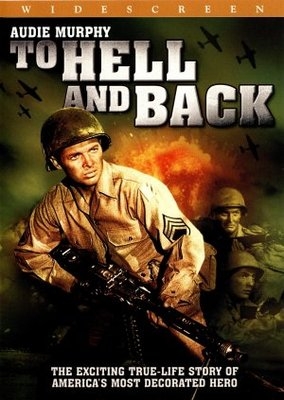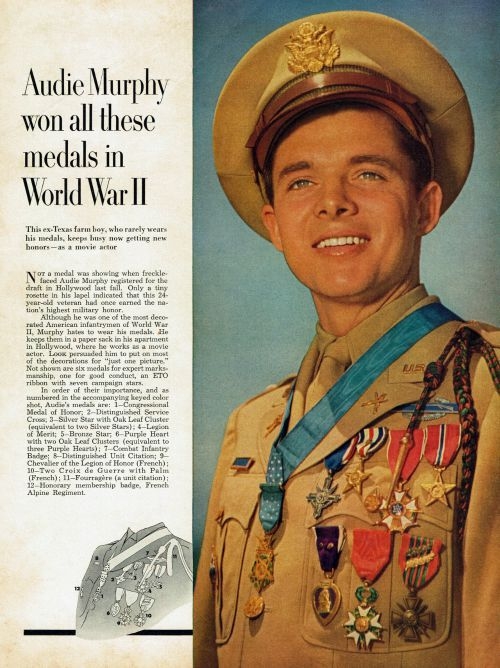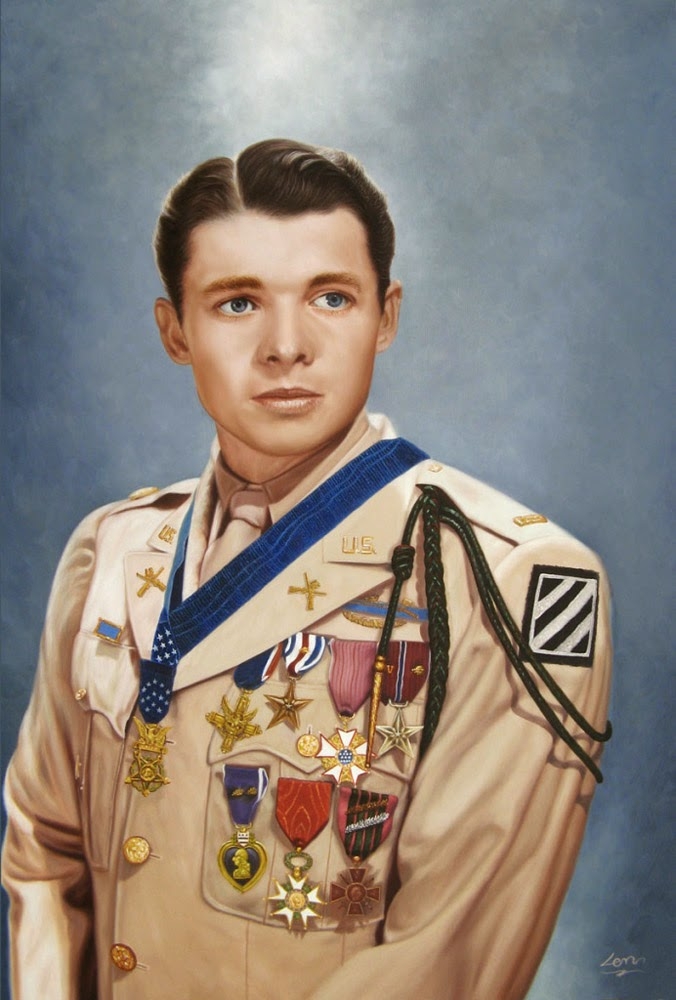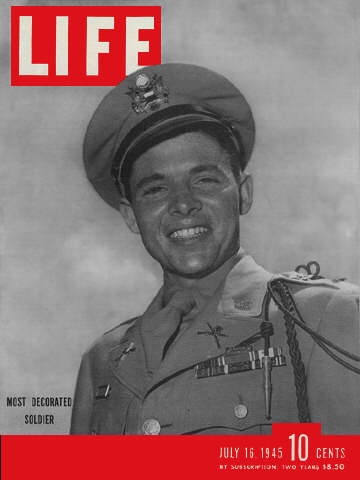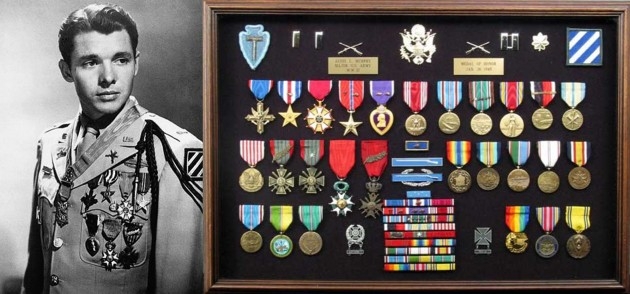Seventy years ago, Audie Murphy wrote the final chapter in one of the most storied military careers in American history. During intense fighting in the Colmar Pocket along the French-Swiss border, the 19-year-old 2nd Lieutenant manned a machine gun on a burning tank destroyer and made a desperate solo attack against German forces. Murphy won the Medal of Honor for his actions, and later parlayed his military celebrity into a successful post-war film career.
On January 26, 1945, Audie Murphy and some 40 U.S. troops sat shivering in a frigid, snow-covered clearing near the Alsatian town of Holtzwihr. The battle-weary soldiers had been ordered to hold a vital roadway until reinforcements arrived, but the operation was delayed and the promised relief was nowhere to be seen. Just after 2 p.m., the winter stillness was suddenly broken by the thunderclap of an enemy artillery barrage. In the distance, some 250 German troops and six tanks emerged from the woods.
As he watched the Germans line up for an attack, Murphy felt a wave of panic rise in his belly. It was a familiar feeling, one he’d learned to control during 18 months of bitter fighting across Italy and France. At just 19 years old, the baby-faced Texan had already won two Silver Stars and the Distinguished Service Cross, and he was leading men 10 years his senior into battle. Once the shooting began, he knew his instincts would take over. “The nerves will relax,” he later wrote, “the heart, stop its thumping. The brain will turn to animal cunning. The job is directly before us: destroy and survive.”
Murphy knew that his men stood no chance against so large a force, so he instructed most of them to withdraw to pre-prepared defensive positions along a nearby tree line. As they ran for cover, he stayed behind and used his field telephone to call in an artillery strike. He had just enough time to radio in his coordinates before salvos of German tank fire erupted around him. One shell immediately drilled a tree near a machine gun nest and showered its crew with deadly splinters of wood; another hit a nearby tank destroyer and set it ablaze.
Murphy with medals
Murphy with medals
Murphy’s command post was collapsing before his eyes, but he held his ground and continued calling in the Allied artillery. In seconds, a curtain of friendly fire rained down between him and the advancing German infantry, pitting the open field with craters and shrouding everything in a haze of smoke. After emptying his M-1 carbine at the enemy, Murphy grabbed his field telephone and took cover atop the burning tank destroyer. Over the radio, he could hear the artillery commander asking how close the Germans were to his position. “Just hold the phone and I’ll let you talk to one of the bastards!” he yelled back.
The tank destroyer was slowly being engulfed in flames, but Murphy saw that its .50-caliber machine gun turret was still operational. He quickly seized the gun and sprayed a withering fire against the German troops nearest his position. “My numbed brain is intent only on destroying,” Murphy later wrote in his autobiography. “I am conscious only that the smoke and the turret afford a good screen, and that, for the first time in three days, my feet are warm.” He continued firing burst after burst, mowing down Nazi troopers by the dozen and keeping the tanks at bay. All the while, he remained on the phone, directing artillery fire ever closer to his own position and dealing catastrophic damage to the advancing infantry.
From their cover on the edge of the tree line, most of Murphy’s troops could only watch in shock. “I expected to see the whole damn tank destroyer blow up under him any minute,” Private Anthony Abramski later wrote. In fact, the blaze may have saved Murphy’s life. Many of the German troops and tank commanders couldn’t see him behind the veil of smoke and flames, and those that did resisted getting too close out of fear that the vehicle was about to explode.
Despite the hail of Allied artillery shells, fresh waves of German infantrymen continued inching toward Murphy’s position. One squad tried to make a flanking maneuver on his right side, only to be cut down in a hail of pinpoint fire from his .50-caliber gun. As Murphy continued his one-man attack, German gunners riddled his smoldering tank destroyer with small arms and tank fire. One blast nearly threw him from the vehicle and sent razor sharp shrapnel flying into his leg, but he took no account of the wound and kept fighting. It was only when Murphy ran out of ammunition that he finally withdrew. Dazed and bloodied, he jumped from the still-burning tank destroyer and limped to his men. He later wrote that as he walked away, one thought in particular kept racing through his mind: “How come I’m not dead?”
Murphy’s men were no doubt wondering the same thing. It was the “greatest display of guts and courage I have ever seen,” a stunned Abramski later wrote. “For an hour he held off the enemy force singlehanded, fighting against impossible odds.” Murphy had personally killed or wounded some 50 enemy troops and directed artillery against dozens more. Even after reaching safety, he refused to be evacuated from the field and instead rallied his men in a counterattack that drove the Germans back into the woods.
Audie Murphy was hailed a national hero and awarded the Medal of Honor for his jaw dropping exploits at Holtzwihr. Not wanting to risk the life of its newest celebrity soldier, the Army reassigned him as a liaison officer and did its best to keep him out of combat until the war ended. By then, the battle-hardened G.I. had endured three wounds, a nasty case of malaria, gangrene and more dead friends than he cared to remember. “There is VE-Day without,” he wrote of his mixed feelings at the war’s end, “but no peace within.”
Murphy returned home in June 1945 to a hero’s welcome of parades, swarming reporters and his face on the cover of Life Magazine. On the advice of screen legend James Cagney, he later took his boyish good looks to Hollywood, where he forged a film career that included more than 40 credits, most of them in Westerns and war films. His most famous role came in 1955, when he played himself in “To Hell and Back,” a blockbuster adaptation of his own memoir about World War II. Reliving the horrors of combat in front of the camera proved difficult for Murphy, who had suffered from nightmares and flashbacks since returning home. He later spoke publicly about his decades-long struggle with post-traumatic stress disorder, and urged the U.S. government to provide better mental healthcare for its veterans.
“To Hell and Back” was a smash hit—the film was Universal Studios’ most profitable release until “Jaws” in 1975—and it helped seal Murphy’s reputation as one of the most famous American veterans of World War II. But despite having won several dozen medals for valor, he always resisted attempts to label him a hero. “Bravery is just determination to do a job that you know has to be done,” he told reporters upon returning home in 1945. “I just fought to stay alive, like anyone else, I guess.”
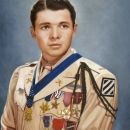
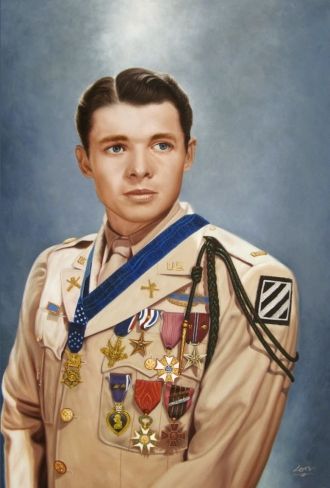
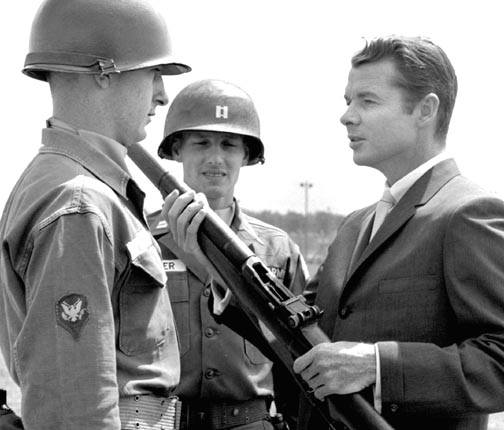
 Amanda S. Stevenson
Amanda S. Stevenson 